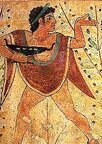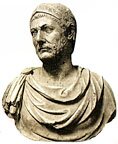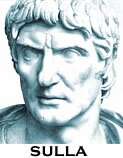| 753 B.C. |
|
Rome Was Founded About This Time
" There Were Many People Living Around The Seven Hills That Surround Rome, Then Called Latrium, Along The Tiber River.
" Rome Is Located On A Fertile Coastal Plain.
" The Tiber River Provided Food And Transportation.
" Period Of The Ten Kings Begins
|
| 750 BC |
|
 " Greeks Had Established About 48 City-States On Southern And Western Shores Of Italy And Sicily And Were Called "Magna Graecia" (great Greece). " Greeks Had Established About 48 City-States On Southern And Western Shores Of Italy And Sicily And Were Called "Magna Graecia" (great Greece).
" The Greeks Influenced Both Etruscans And Romans And Were The Origin Of The Western Version Of The Greek Alphabet As Well As Fine Art
|
| 625 BC |
|
" Swamps Below The Hills Were Drained By A Canal Called The Cloaca Maxima, And The Central Marketplace, The Forum, Was Built
" Etruscan Kings Begin Their Reign And That Lasted Until 509 Bc
" The Etruscans Were A Sophisticated, Literate And Technologically Advanced People
" They Traded With The Greeks And Phoenicians
" They Taught The Romans The Art Of Temple Building And Their Religious Beliefs |
| 509 BC |
|
" Superbus, The Last Etruscan King Was Expelled And The Roman Republic Was Established
" Romans Established An Unwritten Constitution And A Government Consisting Of Executives (consuls), Senate (advisors Who Older Patricians And Wealthy), Assembly (all Citizens Or Plebeians) |
| 494 BC |
|
" Plebeians Revolt And Leave Rome And Get The Right To Be Represented By Tribunes. It Became A Religious Crime To Injure The Body Of A Tribune. They Were Granted Significant Power. |
| 450 BC |
|
" First Written Code Of Law Called The Twelve Tablets Was Created |
| 445 BC |
|
" Plebeians Got The Right To Marry Into The Patrician Class Which Eventually Led To An Aristocracy Comprised Of Members From Both Classes. |
| 390 BC |
|
The Celts Attack And Destroy Rome |
| 287 BC |
|
" Plebeians Got The Power To Make Decisions In The Assembly That Were Binding On The State Without Further Action By Any Other Body |
| 265 BC |
|
" Rome Got Control Of The Italian Peninsula, (except The Po Valley) And Established Colonies
" Rome Formed A "confederate System" But Without Equal Rights For The Other Partners
" Residents Of Some Communities Were Granted Roman Citizenship. But Could Not Vote, They Could Inter-marry With Roman Citizens, And Had To Supply Troops To The Roman Army And Pay Taxes
" This Confederation Greatly Expanded The Manpower Needed By Rome To Dominate Larger Regions |
| 264 BC |
|
Rome And Carthage Started The First Punic War Over Who Would Domination Sicily
" The Name Punic Comes From The Latin Word Poeni Meaning Phoenician
" Carthage Was A Major North African City (located Near Present Day Tunis) That Was Founded By The Phoenicians About 700 B.c.
" Carthage Controlled Cities In North Africa, Parts Of Spain, Corsica, Sardinia, And Much Of Sicily By The Time Rome Gained Control Of The Italian Peninsula.
" Carthage Was The Leading Naval Power In The Mediterranean.
" Carthage Lost And Abandoned Sicily, Corsica And Sardinia At The End Of The First Punic War
|
| 218 BC |
|
 " Second Punic War Began With Carthaginian Aggression Led By Hannibal Who Attacked Italy " Second Punic War Began With Carthaginian Aggression Led By Hannibal Who Attacked Italy
" Hannibal Failed To Win And Rome Got Control Of Spain
" Rome Made Carthage Pay Huge Fines
" Carthage Had To Give Up Her Territories Except Land Around The City Itself
" Carthage Had To Promise Not To Raise An Army Without Rome's Permission |
| 149 BC |
|
Third Punic War Was Started By Rome Who Provoked Carthage Into Defending Herself
" Carthage Was Destroyed And Became Part Of The Roman Province Called Africa
|
| 146 BC |
|
Most Of Southern Greece Was Added To This Roman Province
" Phillip V Of Macedonia Had Formed An Alliance With Hannibal And As A Result, Rome Was Forced To Conquer Macedonia And Interfere In Small Wars Between The Greek City-states
" Rome Eventually Absorbed Greece Into The Roman Republic As A Province
" Luxurious And Decadent Life Style Adopted By The Greeks From The Asians Was Introduced To Rome
" Unrest Of The Peasant Class Was Very High As Poverty Became Extreme To The Mass Of People
|
| 134 BC |
|
Tiberius Gracchi Became A Tribune And Was Successful In Getting Government Land Re-distributed To The Plebeian Farmers For Whom the Public Land Was Intended
" He Wanted Public Lands To Be Taken From The Wealthy To Be Given To Dispossessed Farmers
" He Wanted To Re-institute The Limit On The Amount Of Public That Anyone (especially The Wealthy) Could Own.
" He Was Successful In Getting Land Distribution
" Tiberius Assassinated In 133 B.C. When He Ran For Re-election
|
| 129 BC |
|
Pergamum Was "Willed" To Rome When The King Died So Rome Created The Province Of Asia And Based It In The Territory Controlled By Pergamum.
" Governors Were Appointed By The Senate And Allowed To Rule Their Provinces With Absolute Power.
" Provinces Gave The Financial Support For The Republic, Some Paid Money And Others Food, But The Tax Collectors, Equestrians, Increased Taxes And Put The Extra Money In Their Own Pockets. The Provinces Had No Protection From The Tax Collectors
|
| 128 BC |
|
Long Wars And Many Slaves Had Made The Roman Peasants Very Poor And Without A Way Of Making A Living
" Roman Republic Began Suffering Serious Manpower Shortages In The Army Because Only Men Who Had Enough Money To Buy Their Own Arms Could Be Recruited
|
| 123 BC |
|
Gaius Gracchi, Brother Of Tiberius, Became A Tribune
" Gaius Furthered His Brother's Program Of Relocating Displaced Farmers.
" He Got A Reduced Price On Grain Sold To Poor People
" He Proposed Roman Citizenship To People In Rural Areas (not Successful).
" He Was Killed By His Own Slave To Avoid Being Arrested By The Government
|
| 107 BC |
|
Gaius Marius Was Elected Consul For A 5 Year Term
" Gaius Abolished The Requirement That Soldiers Must Own Property To Be In The Military And Took Volunteers Who Were Men From The Plebeian Class, Especially Poor Men
" New Soldiers Were Paid And Got Land When Finished
" Gaius' Army Was Loyal To Him, Not To A Political Clan Or Political Party
|
| 91 BC |
|
The Social War Started And Italian Allies Of Rome Revolted To Obtain Roman Citizenship.
" By 88 B.C., The Revolts Ended And Roman Citizenship Was Extended To Most Italian Allies
|
| 88 BC |
|
 Sulla Invaded The City Of Rome To Put Down Civil Unrest And To Get Rid Of Gaius Marius Sulla Invaded The City Of Rome To Put Down Civil Unrest And To Get Rid Of Gaius Marius
" Sulla Was The First To Invade Rome By Internal Forces
" Sulla Had Himself Named Dictator Without Limiting His Term In The Office
" Increased The Number Of Senators To 600
" Murdered More Than A Thousand Of This Enemies
|
| 73 BC |
|
Slave Revolt Led By Sparticus Was Crushed By Pompey And Crassus |
| 70 BC |
|
Pompey And Crassus Demanded And Receive Consulships |
| 69 BC |
|
Both Resigned And Continued To Win Military Conquests
" Senate Refused To Give Soldiers The Land They Were Promised For Their Military Service
|
| 59 BC |
|
 Julius Caesar Proposed The First Triumvirate Consisting Of Caesar, Pompey And Crassus And Was Supported By The Tribune Julius Caesar Proposed The First Triumvirate Consisting Of Caesar, Pompey And Crassus And Was Supported By The Tribune
" Pompey's Men Got Their Land
" Caesar Married Pompey's Daughter
" Caesar Got Command Over Gaul And Had An Army Big Enough To Expand The Republic
" Caesar Brought Into Rome The Whole Area Of Modern France And Belgium.
" Pompey Eventually Gained Command Of The Two Provinces Of Spain
" Crassus Eventually Gained Command Of Syria Where He Fought Against The Parthian Kingdom And Was Killed In Battle
" Caesar's Wife Died And The Relationship Between Caesar And Pompey Broke Down
" Pompey Changes His Politics To Align Himself To The Optimate Party
|
| 49 BC |
|
The Senate Established Martial Law And Ordered Pompey To Fight Against Julius Caesar And Arrest Him
" Caesar Planned To Return To Rome From Gaul And Seek The Consulship In 48 B.c.
" Many Senator Feared He Would Become A Permanent Dictator Since He Planned To Establish Equality Among The Classses
" Julius Caesar Crossed The Rubicon River From Gaul And Invaded His Own Country.
" The Senators Of The Optimate Party Who Opposed Caesar Fled To Greece, Along With Pompey
" After Establishing Himself Dictator, Caesar Followed Pompey
|
| 48 BC |
|
 Caesar Won A Decisive Battle Against Followers Of Pompey Caesar Won A Decisive Battle Against Followers Of Pompey
" Caesar Pardoned All People Who Opposed Him And Invited Them To Return To Their Homes. Most Refuse.
" Pompey Escaped To Egypt But Was Murdered By Advisers Of The Pharaoh.
" Julius Caesar Reached Egypt Where He Settled A Dispute Between Cleopatra (vii) And Her Brother In Favor Of Cleopatra.
|
| 44 BC |
|
Caesar Had Himself Named Dictator For Life.
" He Rewarded His Followers With Public Offices And Pardoned His Enemies
" Caesar Raised Membership In The Senate To 900 Although From This Time Onward, The Senate Lost Its Formal Authority
" He Raised The Number Of Praetors To 16
" He Divided All Of Italy Into Municipal Areas
" Caesar Settled Many Of His Soldiers In The Colonies And Extended Roman Citizenship Into Some Of The Provinces.
" Caesar Established A 365 Day Calendar (with A Leap Year) Based On Old Egyptian System. The Julian Calendar Lasted Until 1582 When Pope Gregory Xiii Revised It.
" Caesar Was Assassinated On March 15, 44 B.c. Because His Autocratic Rule Was Hated By The Upper Class Who Had Lost Control Of The Government And Treasury |
| 43 BC |
|
A Second Triumvirate Was Formed Between Marc Anthony, Octavian And Lepidus
" The Triumvirate Invaded The City As Sulla Had Done And Took Over The Country, Putting Themselves In Charge
" There Were Many Years Of Conflict Between Octavian And Marc Anthony
" Marc Anthony Died In Egypt
|
| 30 BC |
|
Octavian Became The First Roman Emperor After 7 Years Of Conflict With Marc Anthony And The Men Who Murdered Caesar
" This Marked The End Of The Roman Republic
|







